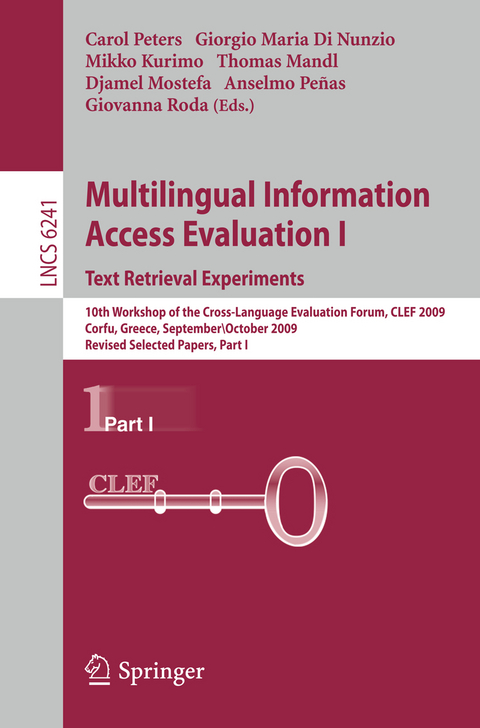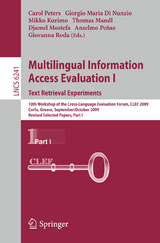Multilingual Information Access Evaluation I - Text Retrieval Experiments
Springer Berlin (Verlag)
978-3-642-15753-0 (ISBN)
What Happened in CLEF 2009.- What Happened in CLEF 2009.- I: Multilingual Textual Document Retrieval (AdHoc).- CLEF 2009 Ad Hoc Track Overview: TEL and Persian Tasks.- CLEF 2009 Ad Hoc Track Overview: Robust-WSD Task.- Evaluating Cross-Language Explicit Semantic Analysis and Cross Querying.- Document Expansion, Query Translation and Language Modeling for Ad-Hoc IR.- Smoothing Methods and Cross-Language Document Re-ranking.- Cross-Language Information Retrieval Using Meta-language Index Construction and Structural Queries.- Sampling Precision to Depth 10000 at CLEF 2009.- Multilingual Query Expansion for CLEF Adhoc-TEL.- Experiments with N-Gram Prefixes on a Multinomial Language Model versus Lucene's Off-the-Shelf Ranking Scheme and Rocchio Query Expansion (TEL@CLEF Monolingual Task).- Evaluation of Perstem: A Simple and Efficient Stemming Algorithm for Persian.- Ad Hoc Retrieval with the Persian Language.- Ad Hoc Information Retrieval for Persian.- Combining Probabilistic and Translation-Based Models for Information Retrieval Based on Word Sense Annotations.- Indexing with WordNet Synonyms May Improve Retrieval Results.- UFRGS@CLEF2009: Retrieval by Numbers.- Evaluation of Axiomatic Approaches to Crosslanguage Retrieval.- UNIBA-SENSE @ CLEF 2009: Robust WSD Task.- Using WordNet Relations and Semantic Classes in Information Retrieval Tasks.- Using Semantic Relatedness and Word Sense Disambiguation for (CL)IR.- II: Multiple Language Question Answering (QA@CLEF).- Overview of ResPubliQA 2009: Question Answering Evaluation over European Legislation.- Overview of QAST 2009.- GikiCLEF: Expectations and Lessons Learned.- NLEL-MAAT at ResPubliQA.- Question Answering on English and Romanian Languages.- Studying Syntactic Analysis in a QA System: FIDJI @ ResPubliQA'09.-Approaching Question Answering by Means of Paragraph Validation.- Information Retrieval Baselines for the ResPubliQA Task.- A Trainable Multi-factored QA System.- Extending a Logic-Based Question Answering System for Administrative Texts.- Elhuyar-IXA: Semantic Relatedness and Cross-Lingual Passage Retrieval.- Are Passages Enough? The MIRACLE Team Participation in QA@CLEF2009.- The LIMSI Participation in the QAst 2009 Track: Experimenting on Answer Scoring.- Robust Question Answering for Speech Transcripts: UPC Experience in QAst 2009.- Where in the Wikipedia Is That Answer? The XLDB at the GikiCLEF 2009 Task.- Recursive Question Decomposition for Answering Complex Geographic Questions.- GikiCLEF Topics and Wikipedia Articles: Did They Blend?.- TALP at GikiCLEF 2009.- Semantic QA for Encyclopaedic Questions: EQUAL in GikiCLEF.- Interactive Probabilistic Search for GikiCLEF.- III: Multilingual Information Filtering (INFILE).- Information Filtering Evaluation: Overview of CLEF 2009 INFILE Track.- Batch Document Filtering Using Nearest Neighbor Algorithm.- UAIC: Participation in INFILE@CLEF Task.- Multilingual Information Filtering by Human Plausible Reasoning.- Hossur'Tech's Participation in CLEF 2009 INFILE Interactive Filtering.- Experiments with Google News for Filtering Newswire Articles.- IV: Intellectual Property (CLEF-IP).- CLEF-IP 2009: Retrieval Experiments in the Intellectual Property Domain.- Exploring Structured Documents and Query Formulation Techniques for Patent Retrieval.- Formulating Good Queries for Prior Art Search.- UAIC: Participation in CLEF-IP Track.- PATATRAS: Retrieval Model Combination and Regression Models for Prior Art Search.- NLEL-MAAT at CLEF-IP.- Simple Pre and Post Processing Strategies for Patent Searching in CLEF IntellectualProperty Track 2009.- Prior Art Search Using International Patent Classification Codes and All-Claims-Queries.- UTA and SICS at CLEF-IP'09.- Searching CLEF-IP by Strategy.- UniNE at CLEF-IP 2009.- Automatically Generating Queries for Prior Art Search.- Patent Retrieval Experiments in the Context of the CLEF IP Track 2009.- Prior Art Retrieval Using the Claims Section as a Bag of Words.- UniGE Experiments on Prior Art Search in the Field of Patents.- V: Logfile Analysis (LogCLEF).- LogCLEF 2009: The CLEF 2009 Multilingual Logfile Analysis Track Overview.- Identifying Common User Behaviour in Multilingual Search Logs.- A Search Engine Based on Query Logs, and Search Log Analysis by Automatic Language Identification.- Identifying Geographical Entities in Users' Queries.- Search Path Visualization and Session Performance Evaluation with Log Files.- User Logs as a Means to Enrich and Refine Translation Dictionaries.- VI: Grid Experiments (GRID@CLEF).- CLEF 2009: Grid@CLEF Pilot Track Overview.- Decomposing Text Processing for Retrieval: Cheshire Tries GRID@CLEF.- Putting It All Together: The Xtrieval Framework at Grid@CLEF 2009.- VII: Morphochallenge.- Overview and Results of Morpho Challenge 2009.- MorphoNet: Exploring the Use of Community Structure for Unsupervised Morpheme Analysis.- Unsupervised Morpheme Analysis with Allomorfessor.- Unsupervised Morphological Analysis by Formal Analogy.- Unsupervised Word Decomposition with the Promodes Algorithm.- Unsupervised Morpheme Discovery with Ungrade.- Clustering Morphological Paradigms Using Syntactic Categories.- Simulating Morphological Analyzers with Stochastic Taggers for Confidence Estimation.- A Rule-Based Acquisition Model Adapted for Morphological Analysis.- Morphological Analysis by Multiple Sequence Alignment.
| Erscheint lt. Verlag | 13.9.2010 |
|---|---|
| Reihe/Serie | Information Systems and Applications, incl. Internet/Web, and HCI | Lecture Notes in Computer Science |
| Zusatzinfo | XXV, 416 p. 110 illus. |
| Verlagsort | Berlin |
| Sprache | englisch |
| Gewicht | 1030 g |
| Themenwelt | Informatik ► Office Programme ► Access |
| Informatik ► Theorie / Studium ► Künstliche Intelligenz / Robotik | |
| Schlagworte | ACCESS • algorithms • classification • Clustering • computer linguistics • cross-language queries • Data Mining • filtering • grid computing • Information Retrieval • Multilingual • Performance • Performance Evaluation • Scoring • Semantic Analysis • Visualization |
| ISBN-10 | 3-642-15753-X / 364215753X |
| ISBN-13 | 978-3-642-15753-0 / 9783642157530 |
| Zustand | Neuware |
| Haben Sie eine Frage zum Produkt? |
aus dem Bereich




